- Home
- Frank Herbert
The Godmakers Page 2
The Godmakers Read online
Page 2
“That’s right.”
“Uh-huh. What else’d you bring into this garden spot?”
“The usual stuff for my job and reports ... and a transmitter, of course.”
“And you pushed the panic button on that transmitter two days ago, eh? Did we get here fast enough for you?”
Orne glared at the floor.
Stetson said: “I suppose you’ve the usual eidetic memory crammed with cultural-medical-industrial-technological information.”
“I’m a fully qualified R&R agent!”
“We will observe a minute of reverent silence,” Stetson said. Abruptly, he slammed a hand onto the table. “It’s a plain damn stupidity! Nothing but a political come-on!”
Orne snapped to angry attention. “What?”
“This R&R dodge, sonny. It’s demagoguery; it’s perpetuating a few political lives by endangering all of us. You mark my words: We’re going to rediscover one planet too many; we’re going to give its people the industrial foundation they don’t deserve; and we’re going to see another Rim War to end all Rim Wars!”
Orne took a step forward, glaring. “Why’n hell do you think I pushed the panic button?”
Stetson sat back, his calm restored by the outburst. “My dear fellow, that’s what we’re now trying to determine.” He tapped his front teeth with the stylus. “Now, just why did you call us?”
“I told you! It’s ...” He waved a hand at the window.
“You felt lonely and wanted the I-A to come hold your hand, that it?”
“Oh, go to hell!” Orne barked. “In due time, son. In due time.” Stetson’s drooping eyelids drooped even farther.
“Now ... just what’re they teaching you R&R dummies to look for these days?”
Orne swallowed another angry reply. “War signs.”
“What else? But let’s be specific.”
“We look for fortifications, for war games among the children, for people drilling or other signs of armylike group activities ...”
“Such as uniforms?”
“Certainly! And for war scars, wounds on people and buildings, the level of wound treatment knowledge in the medical profession, indications of wholesale destruction—you know, things like that.”
“The gross evidence.” Stetson shook his head from side to side. “Do you consider this adequate?”
“No, damn it, I don’t!”
“You’re sooooo right,” Stetson said. “Hmmmmmm. Let’s us dig a little deeper. I don’t quite understand what bothers you about the honest citizenry here.”
Orne sighed, shrugged. “They have no spirit, no bounce. No humor. They live in perpetual seriousness bordering on gloom.”
“Oh?”
“Yeah. I ... I ... uh ...” Orne wet his lips with his tongue.
“I ... uh ... told the Leaders’ Council our people are very interested in a steady source of froolap bones for making left-handed bone china saucers.”
Stetson jerked forward. “You what?”
“Well, they were so damn serious all the time. I just had as much of it as I could take and, well, I ... uh ...”
“What happened?”
“They asked for a detailed description of the froolap and the accepted method of preparing the bones for shipment.”
“What’d you tell them?”
“Well, I ... Well, according to my description they decided Hamal doesn’t have any froolaps.”
“I see,” Stetson said. “That’s what’s wrong with this place, no froolaps.”
Now I’ve done it, Orne thought. Why can’t I keep my big mouth shut? I’ve just convinced him I’m nuts!
“Any big cemeteries, national monuments, that sort of thing?” Stetson asked.
“Not a one. But they have this custom where they plant their dead vertically and put an orchard tree over them. There are some mighty big orchards.”
“You think that’s significant?”
“It bothers me.”
Stetson took a deep breath, leaned back. He tapped his stylus on the table, stared into the distance. Presently, he asked: “How’re they taking to reeducation?”
“They’re very interested in the industrial end. That’s why I’m here in Pitsiben village. We’ve located a tungsten source nearby and—”
“What about their medical people?” Stetson interrupted. “Wound knowledge, that sort of thing?”
“It’s difficult to say.” Orne said. “You know how it is with medics. They have this idea they already know everything and it’s difficult to find out just what they do know. I’m making progress, though.”
“What’s their general medical level?”
“They’ve a good basic knowledge of anatomy, surgery and bone setting. I get no pattern, though, in their knowledge of wounds.”
“Do you have any ideas why this planet is so backward?” Stetson asked.
“Their history says Hamal was accidentally seeded by sixteen survivors—eleven women and five men—from a Tritsahin cruiser disabled in an engagement during the early part of the Rim Wars. They landed with a lifeboat without much equipment and damn little know-how. I take it they were mostly black gang who got away.”
“And here they sat until R&R came along,” Stetson said. “Lovely. Just lovely.”
“That was five hundred Standard Years ago,” Orne said.
“And these gentle people are still farming and hunting,” Stetson murmured. “Oh, lovely.” He glared up at Orne. “How long would it take this planet, granting they have the aggressive drive, to become a definite war menace?”
Orne said: “Well—there are two uninhabited planets in the system they could build up for raw materials. Oh, I’d say twenty to twenty-five S-years after they got the industrial foundation on their home planet.”
“And how long before the aggressive core would have the know-how to go underground so we’d have to blast the planet apart to get at them?”
“Give ’em a year the way they’re going now.”
“You are beginning to see the sweet little problem you R&R dummies create for us!” Stetson pointed an accusing finger at Orne. “And let us make one little slip! Let us declare a planet aggressive and bring in an occupation force and let your damn spies find out we made a mistake!” He doubled his hand into a fist. “A-ha!”
“They’ve already started building factories to produce machine tools,” Orne said.
“They’re quick enough.” He shrugged. “They soak everything up like some dark gloomy sponge.”
“Very poetic,” Stetson growled. He lifted his long frame from the chair, strode to the middle of the room. “Let’s go take a closer look. And I’m warning you, Orne, the I-A has more important things to do than go around wet-nursing R&R.”
“And you’d just love to make us look like a pack of fumbleheads,” Orne said.
“You’re sooooo right, son. That would not make me lose any sleep at all.”
“So what if I made a mistake! A first ... ”
“We’ll see, we’ll see. Come along. We’ll use my go-buggy. ”
Here goes nothing, Orne thought. This schlammler isn’t going to look very hard when it’s easier to sit back and laugh at R&R. I’m finished before we start.
***
Chapter Four
One of the essential problems in engineering a religion for any species is to recognize and refrain from inhibiting those self-regulating systems in the species upon which the species’ survival depends.
—Religious Engineering, field handbook
It already was beginning to grow hot in Pitsiben when Orne and Stetson emerged onto the cobblestone street. The green and yellow flag drooped limply from its mast atop the guesthouse. All activity seemed to have taken on a slower pace. Groups of stolid Hamalites stood before awning-shaded vegetable stalls across from the guesthouse. They gazed moodily at the I-A vehicle parked at the guesthouse doorway. The go-buggy was a white basic two-seater teardrop with wraparound window, a turbine in the rear.
&nb
sp; Orne and Stetson got in, fastened their safety belts.
“There’s what I mean,” Orne said.
Stetson started the turbine whining up to power level, engaged the clutch. The buggy bounced several times on the cobbles until the gyro-spring system took hold. It made a neat, flat turn past the vegetable stalls.
Stetson spoke over the turbine sound: “There’s what you mean what?”
“Those dolts back there. Any other place in the universe they’d have been around your go-buggy ten deep, prying under the rear vents at the turbine, poking underneath at the suspension. These jerks just stand around at a distance and look gloomy.
“No froolap,” Stetson said.
“Yeah!”
“Why do you think they do that?”
“I think they’re obeying orders.”
“Why couldn’t they just be shy?”
“Forget I mentioned it.”
“I see by your reports that there are no walled villages on Hamal,” Stetson said. He slowed the buggy to maneuver between two of the low pushcarts. The farmers gave the buggy only a passing glance.
“None that I’ve seen,” Orne said.
“No military drill by large groups?”
“None that I’ve seen.”
“And no heavy armaments?”
“None that I’ve seen.”
“What’s this none-that-I’ve-seen kick?” Stetson demanded. “Do you suspect them of hiding something?”
“I do.”
“Why?”
“Because things don’t seem to fit on this planet. And when things don’t fit there are missing pieces.”
Stetson took his attention from the street, shot a sharp glance at Orne. “So you’re suspicious.”
Orne grabbed the door handle as the go-buggy swerved around a corner, headed out onto the wide ridge road. “That’s what I told you right at the beginning.”
“We’re always simply delighted to investigate R&R’s slightest suspicions,” Stetson said.
“It’s better for me to make a mistake than it is for you to make one,” Orne growled.
“You will have noticed that their construction is almost entirely of wood,” Stetson said. “At their technological level, wood construction leans to the side of peace.”
“Provided we know what all this means ...” Orne gestured at the countryside “... in technological level.”
“Is that what they’re teaching you now at dear old Uni-Galacta?”
“No. That was my own idea. If they have artillery and mobile cavalry, stone forts would be useless.”
“What would they use for cavalry?” Stetson asked. “According to your reports, there are no riding animals on Hamal.”
“So I haven’t found any ... yet!”
“All right,” Stetson said. “I’ll be reasonable. You spoke of weapons. What weapons? I haven’t seen anything heavier than those fowling pieces carried by their hunters.”
“If they had cannon that’d explain a lot of things,” Orne said.
“Such as the lack of stone forts?”
“You’re damn right!”
“An interesting theory. How do they manufacture the fowling pieces, by the way?”
“They’re produced singly by skilled artisans. It’s a sort of a guild.”
“A sort of a guild. My!” Stetson pulled the go-buggy to a jolting stop on a deserted stretch of the ridge road, shut down the turbine.
Orne stared around him in the silence. It was hot and peaceful. A few hopping insects braved the ridge road’s dusty tracks. Orne experienced the disturbing sensation that he had been in just this situation under these precise circumstances before, that he was repeating his life, caught on a circular track from which there was no escape.
“Did First-Contact see any sign of cannon?” Stetson asked. “You know he didn’t.”
Stetson nodded. “Mmmmmm, hmmmmm.”
“But that could’ve been accident or design,” Orne said. “The stupid schlammler shot off his face the first day and told these people how important it is to us that a redisc planet have a peaceful society.”
“You’re sure of that?”
“I’ve heard the recording.”
“Then you’re sooooo right,” Stetson said. “For once.” He slid out of the buggy. “Come on. Give me a hand.”
Orne got out of his side. “Why’re we stopping?”
Stetson passed him the end of a tape measure. “Hold the idiot end of this at the edge of the road over there like a good fellow, will you?”
Orne obeyed. The plasteel clip at the end of the tape felt cool and dust puffed up between his fingers. The place smelled of earth and musty growing things.
The ridge road proved to be just under seven meters wide. Stetson announced this fact, writing the figure in a notebook. He muttered something about “lines of regression.” They returned to the go-buggy, set off once more down the road.
“What’s important about the width of the road?” Orne asked.
“I-A has a profitable sideline selling omnibuses,” Stetson said. “I just wanted to see if our current models would fit these roads.”
“Funny man!” Orne growled. “I presume it’s increasingly difficult for I-A to justify its appropriations.”
Stetson laughed. “You’re sooooo right! We’re going to put in an additional line of nerve tonic for R&R agents. That should get us out of the red.”
Orne leaned back into his corner, sank into gloom. I’m done for. This smart ass chief operative isn’t going to find anything I didn’t find. There was no real reason for me to call in the I-A except that things don’t fit here.
Stetson turned the go-buggy as the ridge road dipped down to the right through scrub trees.
“We finally get off the high road,” Stetson said.
“If we’d kept straight on we’d have gone down into a swamp,” Orne said.
“Oh?”
The road took them out onto the floor of a wide valley cut by lines of windbreak trees. Smoke spiraled into the still air from behind the trees.
“What’s the smoke over there?” Stetson asked.
“Farmhouses.”
“You’ve looked?”
“Yes! I’ve looked!”
“Touchy, aren’t we?”
The road took them directly toward a river, crossed it on a crude wooden bridge with stone abutments.
Stetson pulled to a stop on the far side of the bridge, stared at the twin lines of a narrow cart track that wound along the riverbank.
Again they got under way, heading toward another ridge.
There were stiled fences beyond the ditches which flanked their road. “Why do they have fences?” Stetson asked.
“To mark their boundaries.”
“Why stiles?”
“To keep out the swamp deer,” Orne said. “It’s reasonable.”
“Stiled fences for boundaries and swamp deer,” Stetson said. “How big are the swamp deer?”
“Lots of evidence—books, stuffed specimens and the like—to show the biggest of them get about half a meter high.”
“And wild.”
“Very wild.”
“Not a very good suspect as a cavalry animal,” Stetson said.
“Definitely ruled out.”
“That means you looked into it.”
“Thoroughly.”
The I-A man pursed his lips in thought, then: “Let’s us go over that about their government again.”
Orne raised his voice above the whine of the turbine as the buggy began to labor in the climb up to another ridge. “What do you mean?”
“That hereditary business.”
“Council membership seems to be passed along on an eldest son basis.”
“Seems to be?” Stetson maneuvered the buggy over a steep rise and onto a road that turned right down the crest of the ridge.
Orne shrugged. “Well, they gave me some hanky-patanky about an elective procedure in case the eldest son dies and there’s no other male
heir.”
“But definitely patriarchal?”
“Definitely.”
“What games do these people play?”
“The children have tops, slingshots, toy carts—but no war toys that I can recognize.”
“And the adults?”
“Their games?”
“Yes. I’ve seen one that’s played by sixteen men in teams of four. They use a square field about fifty meters to the side. It has smooth diagonal ditches crossing from corner to corner to corner. Four men take stations at each corner and rotate turns at play with ...”
“Let me guess,” Stetson said. “They crawl ferociously at each other along those ditches!”
“Very funny! What they do is they use two heavy balls pierced for holding with the fingers. One ball’s green and the other’s yellow. Yellow ball goes first; it’s rolled along the diagonal ditch. The green ball’s supposed to be thrown in such a way that it smacks the yellow ball at the intersection.”
“And it never hits the yellow ball.”
“Sometimes it does. Speed’s erratic.”
“And a great huzzah goes up when they hit,” Stetson said.
“No audience,” Orne said.
“None at all?”
“None that ...”
“I’ve seen,” Stetson chimed in. “Anyway, it appears to be a peaceful game. Are they good at it?”
“Remarkably clumsy, I thought. But they seem to enjoy it. Come to think of it, that game’s one of the few things I’ve ever seen them come close to enjoying.”
“You’re a frustrated missionary,” Stetson said. “People aren’t having fun; you want to jump in and organize games.”
“War games,” Orne said. “Have you thought of that one?”
“Huh?” Stetson took his gaze off the road momentarily. The buggy swerved, bumped along the road’s edge. He jerked his attention back to driving.
“What if some smart R&R type set himself up as emperor on his planet?” Orne asked. “He could start his own dynasty. First thing you’d know about it would be when the bombs started dropping or people started dying from causes unknown.”
“That’s the I-A’s personal nightmare,” Stetson said. He fell silent.
The sun climbed higher as the ridge road wound on past rocky embankments, far vistas of farmlands, passages of sparse bushes and squat, bulbous trees.

 Direct Descent
Direct Descent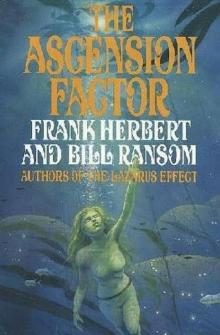 The Ascension Factor
The Ascension Factor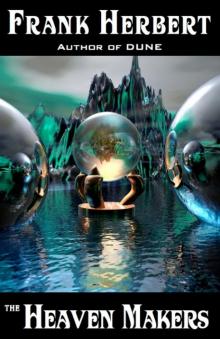 The Heaven Makers
The Heaven Makers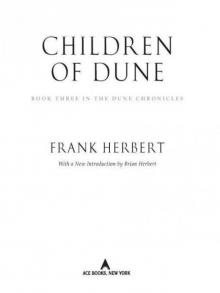 Children of Dune
Children of Dune Old Rambling House
Old Rambling House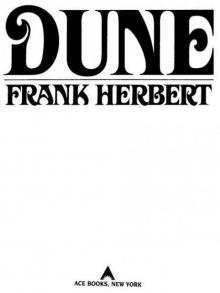 Dune
Dune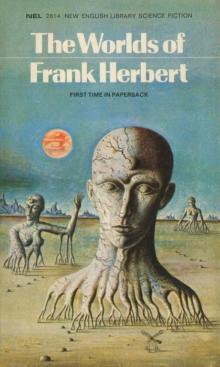 The Worlds of Frank Herbert
The Worlds of Frank Herbert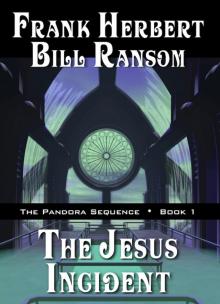 The Jesus Incident
The Jesus Incident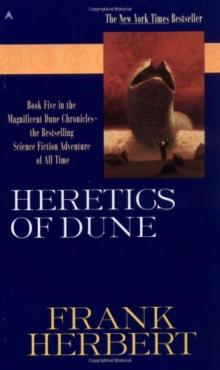 Heretics of Dune
Heretics of Dune Whipping Star
Whipping Star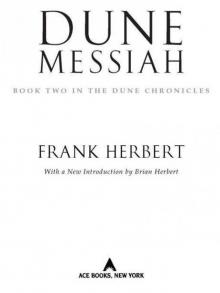 Dune Messiah
Dune Messiah Man of Two Worlds
Man of Two Worlds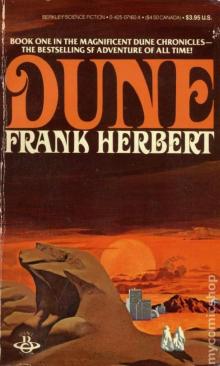 The Book of Frank Herbert
The Book of Frank Herbert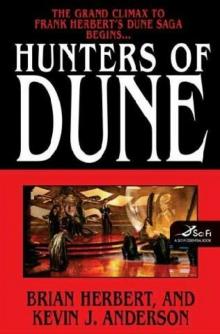 Hunters Of Dune
Hunters Of Dune The Tactful Saboteur
The Tactful Saboteur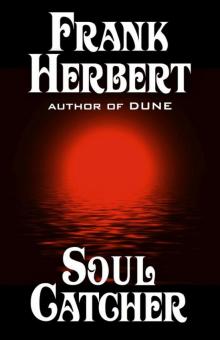 Soul Catcher
Soul Catcher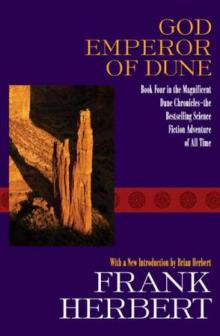 God Emperor of Dune
God Emperor of Dune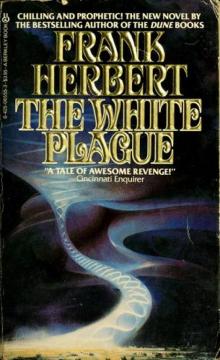 The White Plague
The White Plague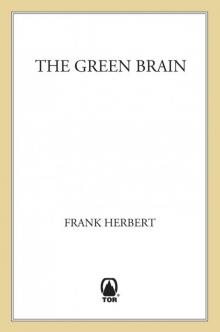 The Green Brain
The Green Brain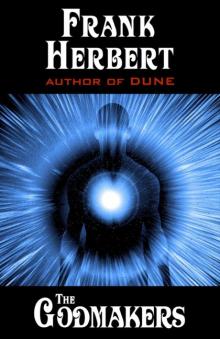 The Godmakers
The Godmakers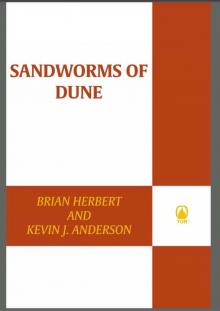 Sandworms of Dune
Sandworms of Dune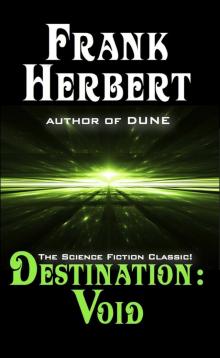 Destination Void
Destination Void The Dosadi Experiment
The Dosadi Experiment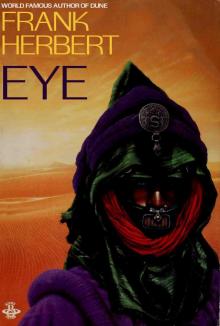 Eye
Eye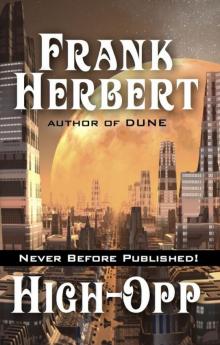 High-Opp
High-Opp The Eyes of Heisenberg
The Eyes of Heisenberg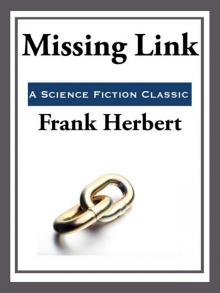 Missing Link
Missing Link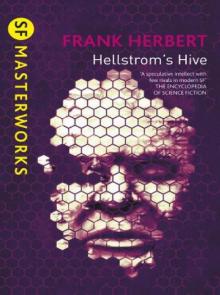 Hellstrom's Hive
Hellstrom's Hive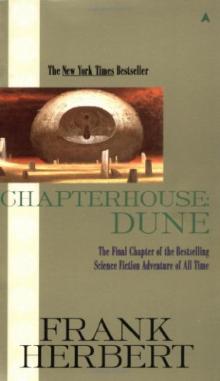 Chapterhouse: Dune
Chapterhouse: Dune The Santaroga Barrier
The Santaroga Barrier The Dragon in the Sea
The Dragon in the Sea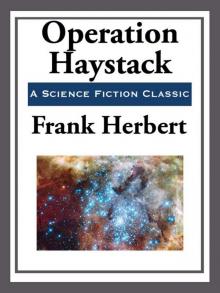 Operation Haystack
Operation Haystack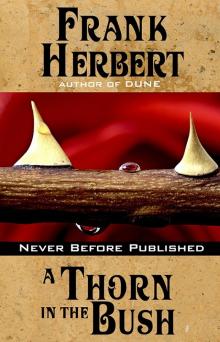 A Thorn in the Bush
A Thorn in the Bush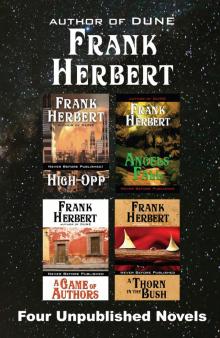 Four Unpublished Novels
Four Unpublished Novels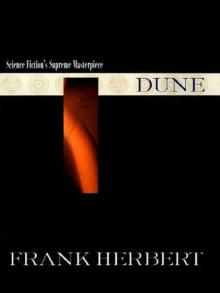 Dune dc-1
Dune dc-1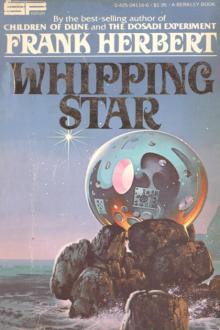 Jorj X. McKie 1 - Whipping Star
Jorj X. McKie 1 - Whipping Star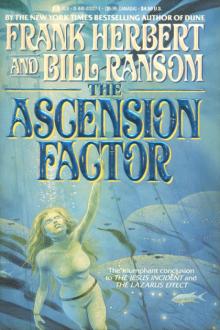 DV 4 - The Ascension Factor
DV 4 - The Ascension Factor Frank Herbert - Dune Book 4 - God Emperor Of Dune
Frank Herbert - Dune Book 4 - God Emperor Of Dune ChapterHouse: Dune dc-6
ChapterHouse: Dune dc-6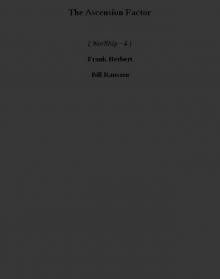 The Ascension Factor w-4
The Ascension Factor w-4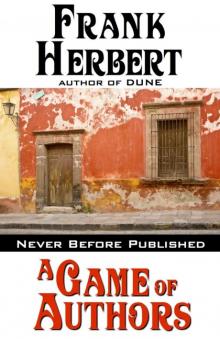 A Game of Authors
A Game of Authors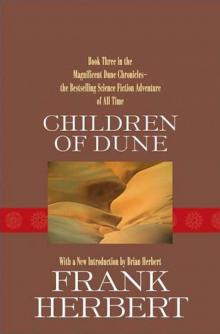 Children of Dune dc-3
Children of Dune dc-3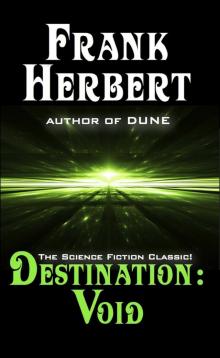 Destination: Void: Prequel to the Pandora Sequence
Destination: Void: Prequel to the Pandora Sequence The Collected Stories of Frank Herbert
The Collected Stories of Frank Herbert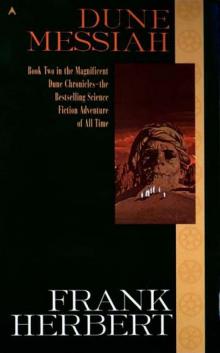 Dune Messiah dc-2
Dune Messiah dc-2 Frank Herbert - Dune Book 5 - Heretics of Dune
Frank Herbert - Dune Book 5 - Heretics of Dune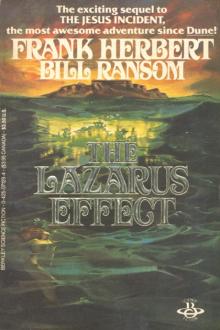 DV 3 - The Lazarus Effect
DV 3 - The Lazarus Effect The Jesus Incident w-2
The Jesus Incident w-2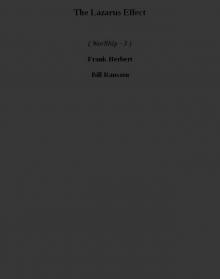 The Lazarus Effect w-3
The Lazarus Effect w-3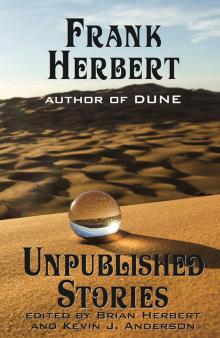 Frank Herbert
Frank Herbert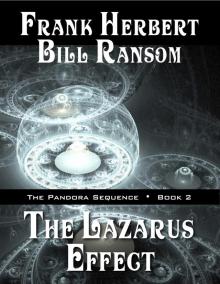 The Ascension Factor: Pandora Sequence
The Ascension Factor: Pandora Sequence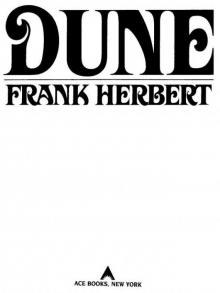 Dune (40th Anniversary Edition)
Dune (40th Anniversary Edition) The Dosadi Experiment c-2
The Dosadi Experiment c-2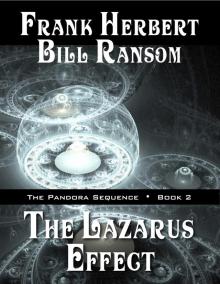 The Lazarus Effect
The Lazarus Effect God Emperor of Dune dc-4
God Emperor of Dune dc-4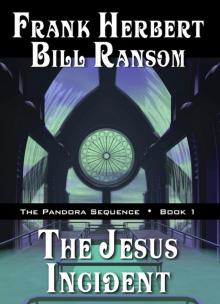 The Pandora Sequence: The Jesus Incident, the Lazarus Effect, the Ascension Factor
The Pandora Sequence: The Jesus Incident, the Lazarus Effect, the Ascension Factor The Green Brain (v4.0)
The Green Brain (v4.0) The Heaven Makers (v4.0)
The Heaven Makers (v4.0) Heretics of Dune dc-5
Heretics of Dune dc-5